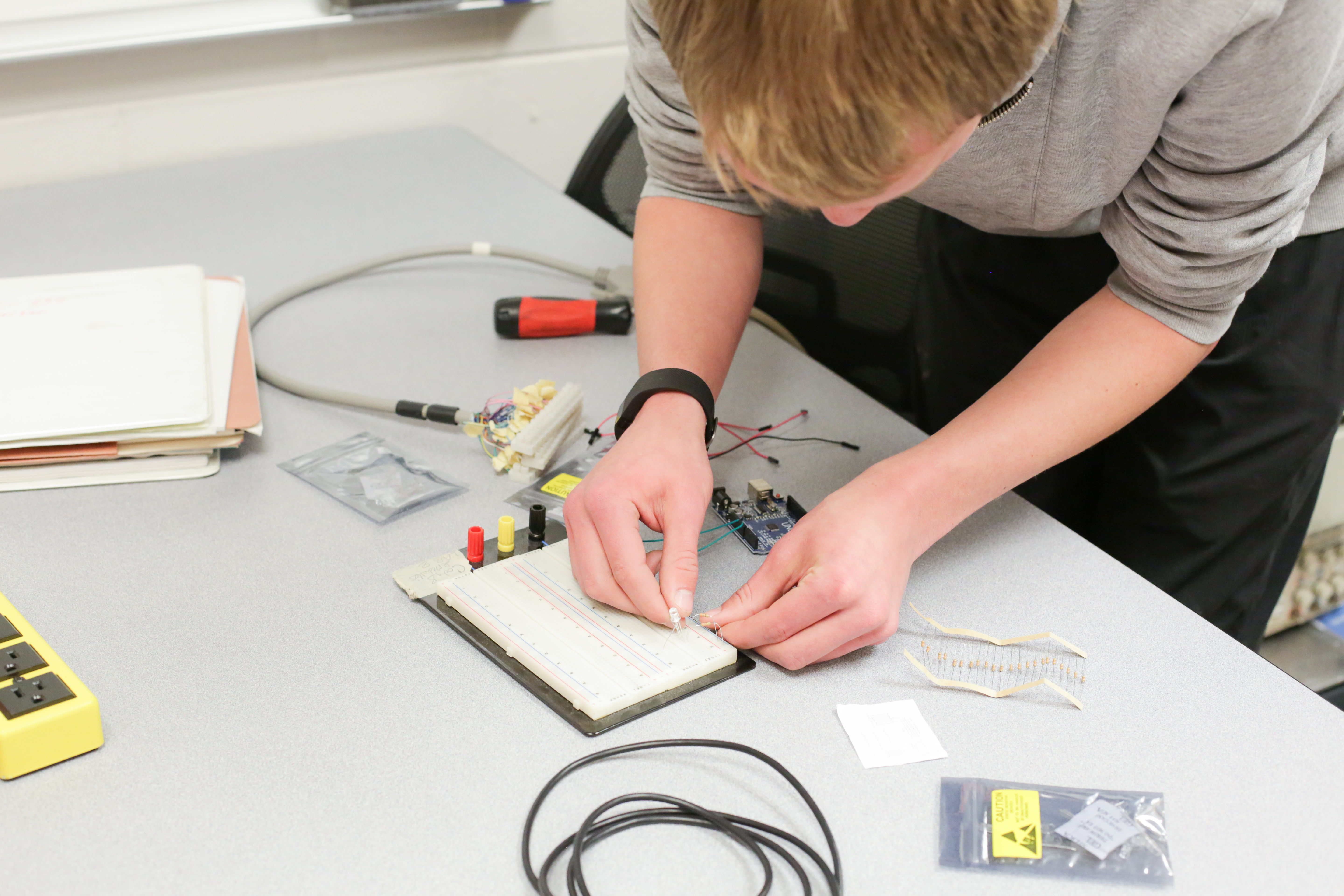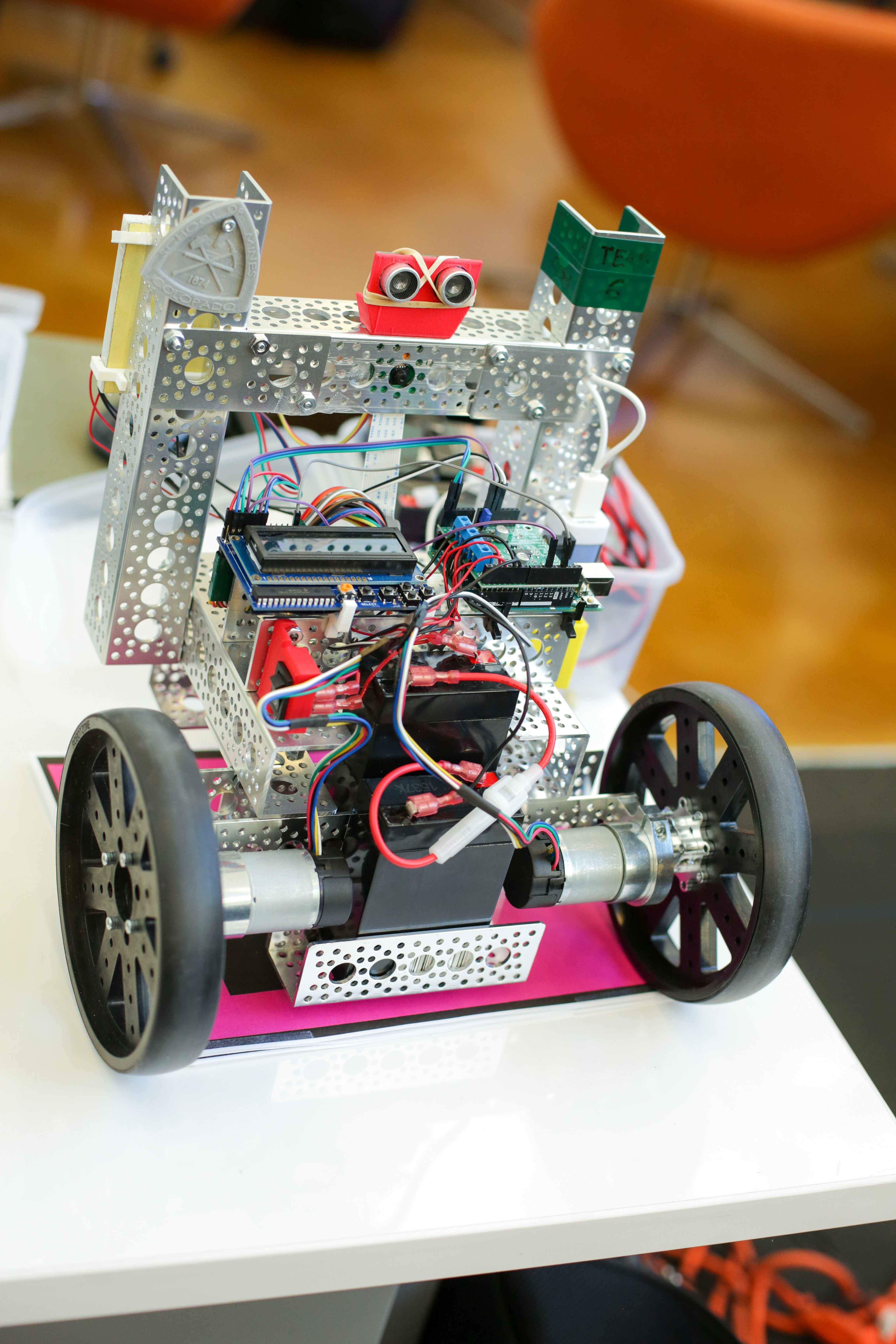Undergraduate Program
Program Overview

- Providing a breadth and depth of technical expertise as it applies to various applications in the broad fields of electrical engineering
- Supplementing technical education with training in professional skills including ethics, communication, societal responsibilities, and team-work
- Creating a student-centered learning environment based on curricular innovation
The undergraduate EE degree at Mines caters to various industries including electric power and energy, renewable energy, aerospace, communications, robotics, and diverse industries that rely on embedded intelligence to manage data and systems. Students graduate with relevant and cutting edge technical knowledge through the core courses and very well-designed specialized electives in the areas of energy systems and power electronics, antennas and wireless communications, information and systems sciences, and integrated circuits and electronics. Undergraduate students in the department have the opportunity to participate in research projects along with graduate students and the faculty.
Why Electrical Engineering?
Electrical Engineering has had one of the most significant impacts on human life in the 21st century. It was at the crux of the invention of devices that we utilize daily and has improved the quality of human life. It is also a core contributor in solving several grand engineering challenges such as the energy crisis by making solar more economical, reverse engineering the brain to advance manufacturing and communication, and enhancing virtual reality to improve healthcare.
According to EngineerSalary.com, electrical engineers (EEs) hold about 319,100 jobs making this the second largest branch of the US engineering community. The same source also suggests that there has been a sharp decline in the number of EE graduates since 2003 which will result in an imbalance between the number of job openings for EEs and the number of graduates in the coming years.
The Sloan Career Cornerstone Center has collected a number of resources of interest to Electrical Engineers, such as a “Day in the Life” description, employment statistics, profiles of professional engineers, and more.
Not convinced? Watch these videos.

Program Objectives and Outcomes
Program Educational Objectives
The Electrical Engineering program is accredited by the Engineering Accreditation Commission of ABET, https://www.abet.org, under the General Criteria and the Electrical, Computer, Communications, Telecommunication(s) and Similarly Named Engineering Programs Program Criteria.
Within three years of attaining the BSEE degree:
- Graduates will be applying their professional Electrical Engineering skills and training in their chosen field or will be successfully pursuing a graduate degree.
- Graduates will be situated in growing careers, generating new knowledge and exercising professional leadership.
- Graduates will be contributing to the needs of society through professional practice, research, and service.
Student Outcomes
The Student Outcomes of the BSEE program are:
1. an ability to identify, formulate, and solve complex engineering problems by applying principles of engineering, science, and mathematics.
2. an ability to apply engineering design to produce solutions that meet specified needs with consideration of public health, safety, and welfare, as well as global, cultural, social, environmental, and economic factors.
3. an ability to communicate effectively with a range of audiences.
4. an ability to recognize ethical and professional responsibilities in engineering situations and make informed judgments, which must consider the impact of engineering solutions in global, economic, environmental, and societal contexts.
5. an ability to function effectively on a team whose members together provide leadership, create a collaborative and inclusive environment, establish goals, plan tasks, and meet objectives.
6. an ability to develop and conduct appropriate experimentation, analyze and interpret data, and use engineering judgment to draw conclusions.
7. an ability to acquire and apply new knowledge as needed, using appropriate learning strategies.
Curriculum
The first two years also includes Engineering design course work within the Introduction to Design (EDNS151). This experience teaches design methodology and stresses the creative and synthesis aspects of the engineering profession. Finally, the first two years includes systems-oriented courses with humanities and social sciences content; these courses explore the linkages within the environment, human society, and engineered devices.
In the final two years, students complete an advanced core that includes circuit analysis, electronics, electromagnetic fields and waves, and digital systems. Because of our program focus, the core curriculum also includes courses in signal processing, embedded microprocessor systems design, machines and power systems, and control systems. Students can also take specialized electives that further develop their expertise in one of these focus areas, or in other areas such as robotics, biomedical engineering, and computing.
In their final year, students complete a capstone design course that is focused on an in-depth engineering project. The projects are generated by customer demand, and include experiential verification to ensure a realistic design experience.
The Electrical Engineering program is accredited by the Engineering Accreditation Commission of ABET, https://www.abet.org, under the General Criteria and the Electrical Engineering and Similarly Named Engineering Programs Program Criteria.
The enrollment and graduation data for the Electrical Engineering program and other Mines programs can be found on the home page of the Office of Institutional Research.
See the Mines Catalog for the complete course list and descriptions
EE Undergraduate Curriculum Recent Activities
More information coming later in 2023.
Flowcharts
- Degree requirements change over time. Your requirements are determined based on the year you entered the degree program.
- You can switch to a later catalog, if you desire. Forms are available at the registrar’s office. Will require a signature from your advisor.
- You may not switch to an earlier catalog. Flowcharts from prior years are included here for the benefit of students who entered during those years.
So as not to confuse or mislead, these flowcharts simply represent a sample curriculum. If there are any discrepancies between this information and other sources, the final authority is the catalog published the year the student entered Mines.
Archive:
BS + MS Combined Program
The Electrical Engineering Department offers the opportunity to begin working on a Master’s Non-Thesis Degree while completing the requirements for their Bachelor’s Degree. This is known as a “Combined Program” or “4+1,” essentially allowing a student to complete a Bachelor’s Degree and Master’s Non-Thesis Degree in five years.
Students accepted into a combined program may substitute up to six credits of graduate coursework to fulfill requirements of their undergraduate degree and then also use these credits to fulfill the requirements of their graduate degree. These courses are referred to as “double-counted courses” and must be completed with a grade of B- or better.
See the Mines Catalog and the Graduate Studies Combined Degrees website for additional information.
Interest Pathways and Minors
Interest Pathways
EE majors can choose to get more in-depth knowledge in a specific area by choosing to specialize their EE technical electives. We offer electives in four specialty areas of study within electrical engineering: Information Systems and Science, Antennas and Wireless Communications, Power and Energy Systems, and Integrated Circuits and Electronics.
To see which EE technical electives align with each of the four option interest pathways, review page 2 of the EE 2023-2024 Flowchart here; electives are color-coded according to pathway.
These pathways are optional. Students can choose to complete their EE electives however they see fit (no specialty required), as long as they complete 15 credits of Electrical Engineering Electives from the approved list in the 2023-2024 catalog and at least 9 credits out of the 15 credits are 400-level or higher EENG-prefix courses.
Minors:
Electrical Engineering Minor
EE majors are not able to earn a minor or ASI in EE. If they want to specialize their studies, they will do so by completing their EE technical electives.
Minors Available for EE Majors
EE majors can earn a minor is another discipline. Visit this website for a current list of available undergraduate minors. For additional information about a minor, the following resources can help:
- Review the Mines Catalog for minors that fall under a specific department
- Review the Mines Catalog for minor that are interdisciplinary
- Contact the CASA Major Advisor that supports the department that offers the minor(s) you are interested in